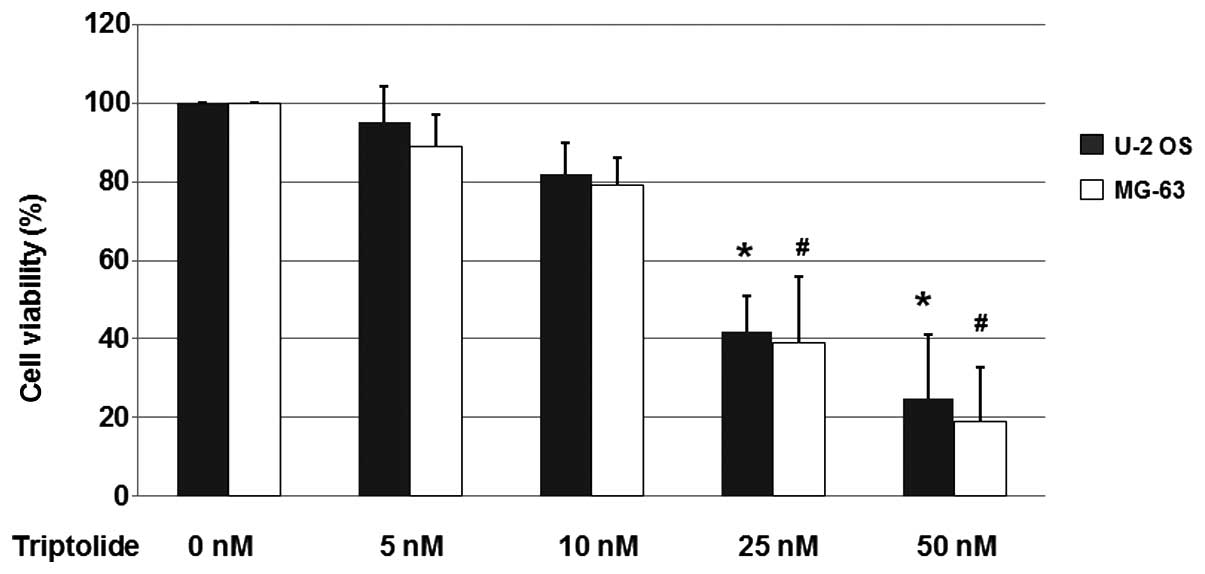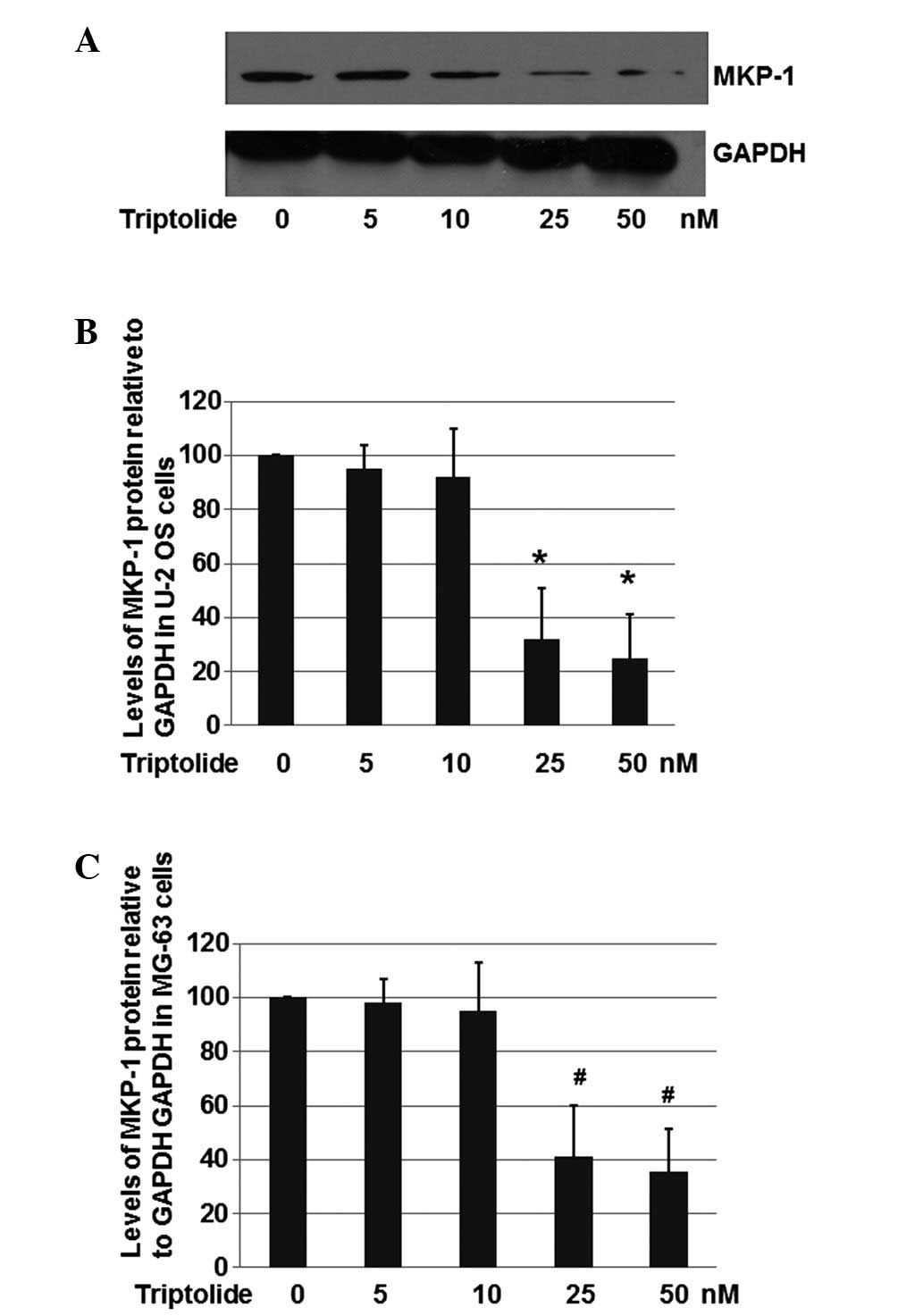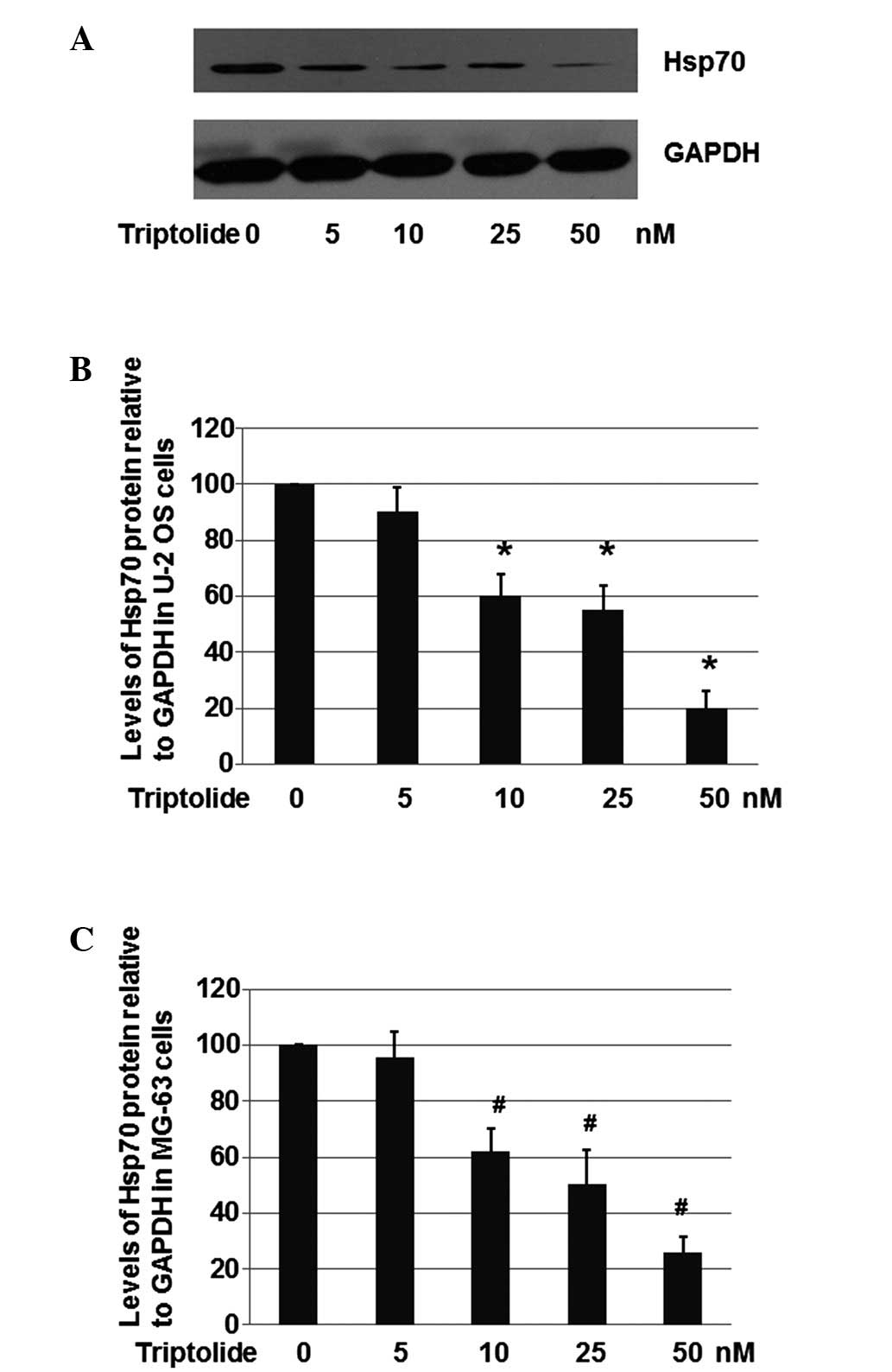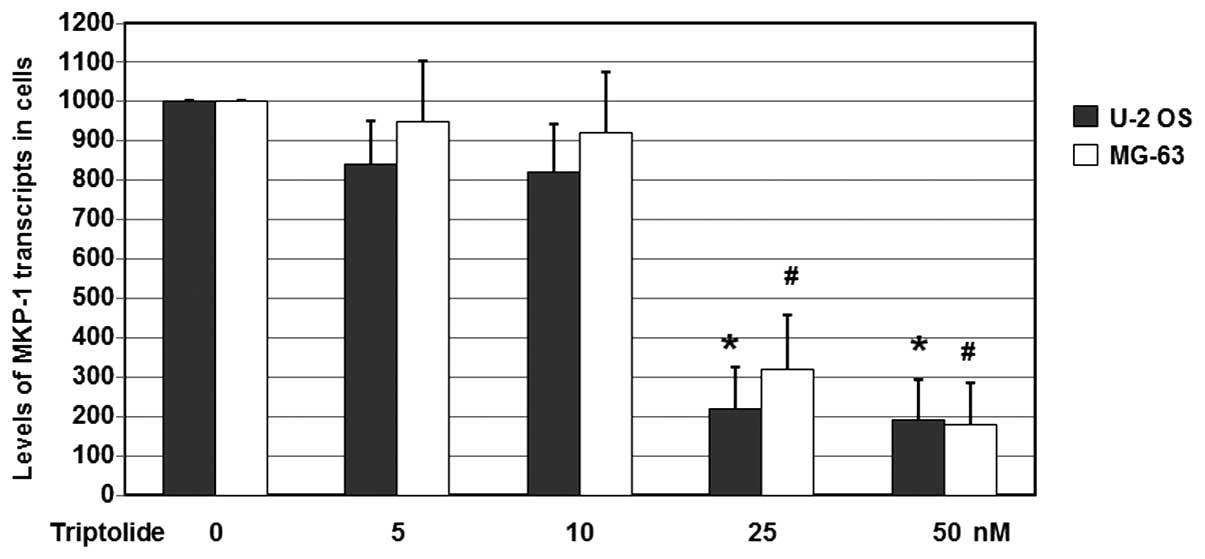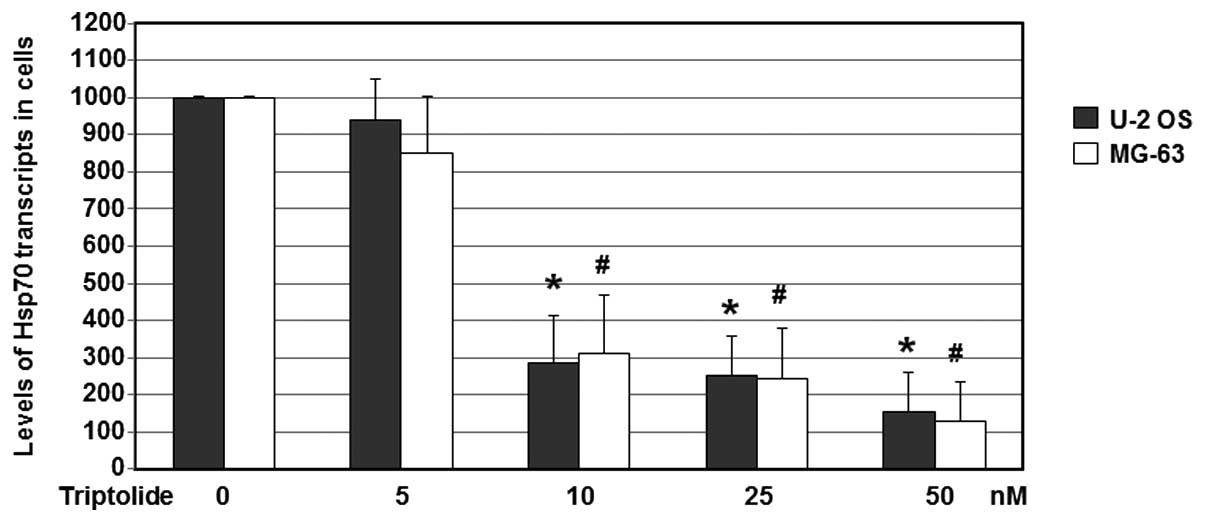|
1
|
Kourti M, Sidi V and Papakonstantinou E:
Osteosarcoma in an adolescent previously treated for Hodgkin's
Disease. Hippokratia. 18:962014.PubMed/NCBI
|
|
2
|
Xu SF, Yu XC, Xu M and Chen X: Successful
management of a childhood osteosarcoma with epiphysiolysis and
distraction osteogenesis. Curr Oncol. 21:e658–e662. 2014.
View Article : Google Scholar : PubMed/NCBI
|
|
3
|
Zhou Y, Huang Z, Wu S, Zang X, Liu M and
Shi J: miR-33a is up-regulated in chemoresistant osteosarcoma and
promotes osteosarcoma cell resistance to cisplatin by
down-regulating TWIST. J Exp Clin Cancer Res. 33:122014. View Article : Google Scholar : PubMed/NCBI
|
|
4
|
Yang J and Zhang W: New molecular insights
into osteosarcoma targeted therapy. Curr Opin Oncol. 25:398–406.
2013. View Article : Google Scholar : PubMed/NCBI
|
|
5
|
Wong KF, Yuan Y and Luk JM:
Tripterygium wilfordii bioactive compounds as anticancer and
anti-inflammatory agents. Clin Exp Pharmacol Physiol. 39:311–320.
2012. View Article : Google Scholar : PubMed/NCBI
|
|
6
|
Zhou ZL, Yang YX, Ding J, Li YC and Miao
ZH: Triptolide: Structural modifications, structure-activity
relationships, bioactivities, clinical development and mechanisms.
Nat Prod Rep. 29:457–475. 2012. View Article : Google Scholar : PubMed/NCBI
|
|
7
|
Huang W, He T, Chai C, Yang Y, Zheng Y,
Zhou P, Qiao X, Zhang B, Liu Z and Wang J: Triptolide inhibits the
proliferation of prostate cancer cells and down-regulates
SUMO-specific protease 1 expression. PLoS One. 7:e376932012.
View Article : Google Scholar : PubMed/NCBI
|
|
8
|
Banerjee S, Sangwan V, McGinn O, Chugh R,
Dudeja V, Vickers SM and Saluja AK: Triptolide-induced cell death
in pancreatic cancer is mediated by O-GlcNAc modification of
transcription factor Sp1. J Biol Chem. 288:33927–33938. 2013.
View Article : Google Scholar : PubMed/NCBI
|
|
9
|
Crowell S, Wancket LM, Shakibi Y, Xu P,
Xue J, Samavati L, Nelin LD and Liu Y: Post-translational
regulation of mitogen-activated protein kinase phosphatase (MKP)-1
and MKP-2 in macrophages following lipopolysaccharide stimulation:
The role of the C termini of the phosphatases in determining their
stability. J Biol Chem. 289:28753–28764. 2014. View Article : Google Scholar : PubMed/NCBI
|
|
10
|
Doddareddy MR, Rawling T and Ammit AJ:
Targeting mitogen-activated protein kinase phosphatase-1 (MKP-1):
structure-based design of MKP-1 inhibitors and upregulators. Curr
Med Chem. 19:163–173. 2012. View Article : Google Scholar : PubMed/NCBI
|
|
11
|
Chen FM, Chang HW, Yang SF, Huang YF, Nien
PY, Yeh YT and Hou MF: The mitogen-activated protein kinase
phosphatase-1 (MKP-1) gene is a potential methylation biomarker for
malignancy of breast cancer. Exp Mol Med. 44:356–362. 2012.
View Article : Google Scholar : PubMed/NCBI
|
|
12
|
Lei YY, Wang WJ, Mei JH and Wang CL:
Mitogen-activated protein kinase signal transduction in solid
tumors. Asian Pac J Cancer Prev. 15:8539–8548. 2014. View Article : Google Scholar : PubMed/NCBI
|
|
13
|
Park J, Lee J, Kang W, Chang S, Shin EC
and Choi C: TGF-β1 and hypoxia-dependent expression of MKP-1 leads
tumor resistance to death receptor-mediated cell death. Cell Death
Dis. 4:e5212013. View Article : Google Scholar : PubMed/NCBI
|
|
14
|
Jolly C and Morimoto RI: Role of the heat
shock response and molecular chaperones in oncogenesis and cell
death. J Natl Cancer Inst. 92:1564–1572. 2000. View Article : Google Scholar : PubMed/NCBI
|
|
15
|
Borges JC, Seraphim TV, Mokry DZ, Almeida
FC, Cyr DM and Ramos CH: Identification of regions involved in
substrate binding and dimer stabilization within the central
domains of yeast Hsp40 Sis1. PLoS One. 7:e509272012. View Article : Google Scholar : PubMed/NCBI
|
|
16
|
Dougan DA, Mogk A and Bukau B: Protein
folding and degradation in bacteria: to degrade or not to degrade?
That is the question. Cell Mol Life Sci. 59:1607–1616. 2002.
View Article : Google Scholar : PubMed/NCBI
|
|
17
|
Kelley WL: Molecular chaperones: How J
domains turn on Hsp70s. Curr Biol. 9:R305–308. 1999. View Article : Google Scholar : PubMed/NCBI
|
|
18
|
Nylandsted J, Brand K and Jäättelä M: Heat
shock protein 70 is required for the survival of cancer cells. Ann
N Y Acad Sci. 926:122–125. 2000. View Article : Google Scholar : PubMed/NCBI
|
|
19
|
Shi W, Zhou Y, Wild J, Adler J and Gross
CA: DnaK, DnaJ and GrpE are required for flagellum synthesis in
Escherichia coli. J Bacteriol. 174:6256–6263. 1992.PubMed/NCBI
|
|
20
|
Rérole AL, Jego G and Garrido C: Hsp70:
Anti-apoptotic and tumorigenic protein. Methods Mol Biol.
787:205–230. 2011. View Article : Google Scholar : PubMed/NCBI
|
|
21
|
Guo F, Rocha K, Bali P, Pranpat M, Fiskus
W, Boyapalle S, Kumaraswamy S, Balasis M, Greedy B and Armitage ES:
Abrogation of heat shock protein 70 induction as a strategy to
increase antileukemia activity of heat shock protein 90 inhibitor
17-allylamino-demethoxy geldanamycin. Cancer Res. 65:10536–10544.
2005. View Article : Google Scholar : PubMed/NCBI
|
|
22
|
Hyun JJ, Lee HS, Keum B, Seo YS, Jeen YT,
Chun HJ, Um SH and Kim CD: Expression of heat shock protein 70
modulates the chemoresponsiveness of pancreatic cancer. Gut Liver.
7:739–746. 2013. View Article : Google Scholar : PubMed/NCBI
|
|
23
|
Endo H, Yano M, Okumura Y and Kido H:
Ibuprofen enhances the anticancer activity of cisplatin in lung
cancer cells by inhibiting the heat shock protein 70. Cell Death
Dis. 5:e10272014. View Article : Google Scholar : PubMed/NCBI
|
|
24
|
Livak KJ and Schmittgen TD: Analysis of
relative gene expression data using real-time quantitative PCR and
the 2−ΔΔCt method. Methods. 25:402–408. 2001. View Article : Google Scholar : PubMed/NCBI
|
|
25
|
Kelley WL: The J-domain family and the
recruitment of chaperone power. Trends Biochem Sci. 23:222–227.
1998. View Article : Google Scholar : PubMed/NCBI
|
|
26
|
Calderwood SK, Khaleque MA, Sawyer DB and
Ciocca DR: Heat shock proteins in cancer: Chaperones of
tumorigenesis. Trends Biochem Sci. 31:164–172. 2006. View Article : Google Scholar : PubMed/NCBI
|
|
27
|
Wang Y, Liang X, Wu S, Murrell GA and Doe
WF: Inhibition of colon cancer metastasis by a 3′-end antisense
urokinase receptor mRNA in a nude mouse model. Int J Cancer.
92:257–262. 2001. View Article : Google Scholar : PubMed/NCBI
|
|
28
|
Zhuang H, Jiang W, Zhang X, Qiu F, Gan Z,
Cheng W, Zhang J, Guan S, Tang B and Huang Q: Suppression of HSP70
expression sensitizes NSCLC cell lines to TRAIL-induced apoptosis
by upregulating DR4 and DR5 and downregulating c-FLIP-L
expressions. J Mol Med (Berl). 91:219–235. 2013. View Article : Google Scholar : PubMed/NCBI
|
|
29
|
Juhasz K, Lipp AM, Nimmervoll B,
Sonnleitner A, Hesse J, Haselgruebler T and Balogi Z: The complex
function of hsp70 in metastatic cancer. Cancers (Basel). 6:42–66.
2013. View Article : Google Scholar : PubMed/NCBI
|
|
30
|
Gabai VL, Yaglom JA, Waldman T and Sherman
MY: Heat shock protein Hsp72 controls oncogene-induced senescence
pathways in cancer cells. Mol Cell Biol. 29:559–569. 2009.
View Article : Google Scholar : PubMed/NCBI
|
|
31
|
Rohde M, Daugaard M, Jensen MH, Helin K,
Nylandsted J and Jäättelä M: Members of the heat-shock protein 70
family promote cancer cell growth by distinct mechanisms. Genes
Dev. 19:570–582. 2005. View Article : Google Scholar : PubMed/NCBI
|
|
32
|
Gurbuxani S, Schmitt E, Cande C,
Parcellier A, Hammann A, Daugas E, Kouranti I, Spahr C, Pance A,
Kroemer G and Garrido C: Heat shock protein 70 binding inhibits the
nuclear import of apoptosis-inducing factor. Oncogene.
22:6669–6678. 2003. View Article : Google Scholar : PubMed/NCBI
|
|
33
|
Wang BY, Cao J, Chen JW and Liu QY:
Triptolide induces apoptosis of gastric cancer cells via inhibiting
the overexpression of MDM2. Med Oncol. 31:2702014. View Article : Google Scholar : PubMed/NCBI
|
|
34
|
Cheng S, LeBlanc KJ and Li L: Triptolide
preserves cognitive function and reduces neuropathology in a mouse
model of Alzheimer's disease. PLoS One. 9:e1088452014. View Article : Google Scholar : PubMed/NCBI
|















